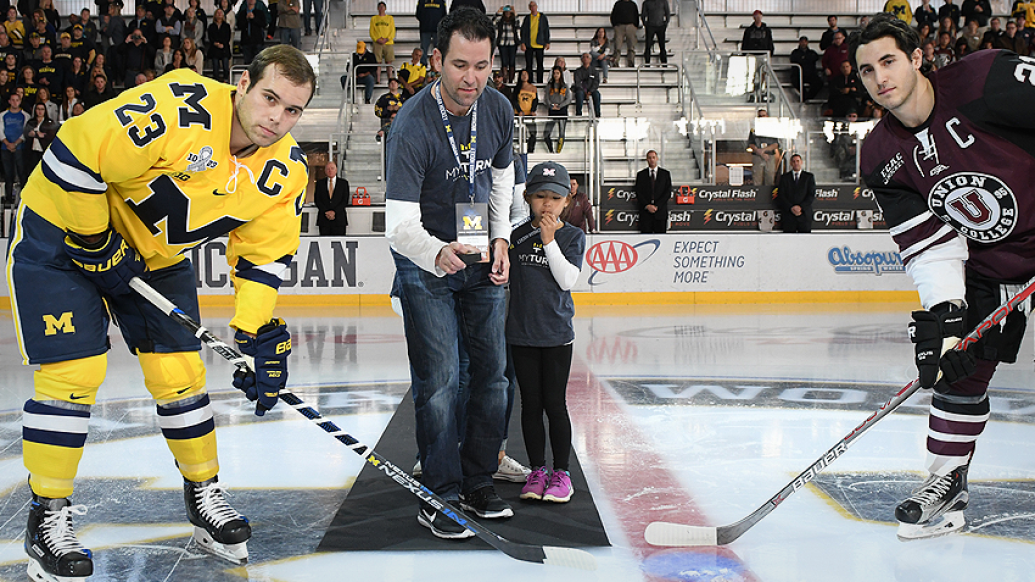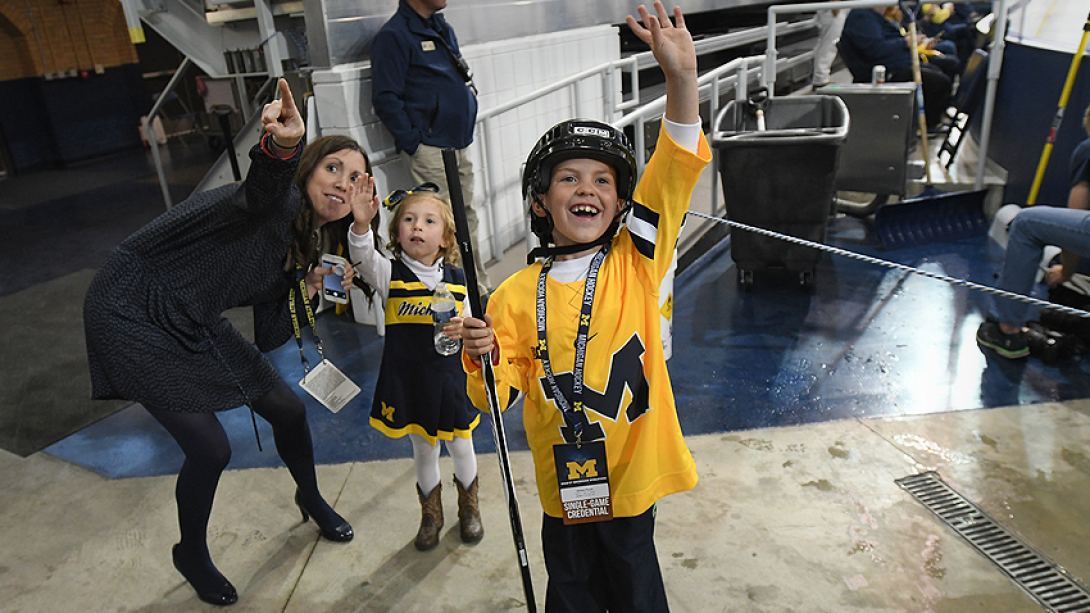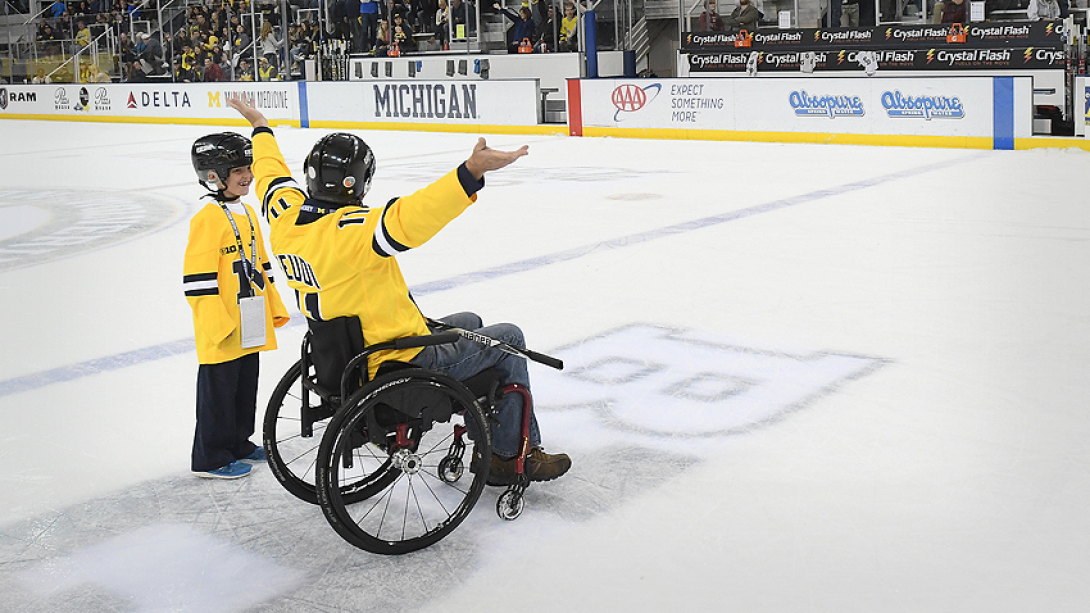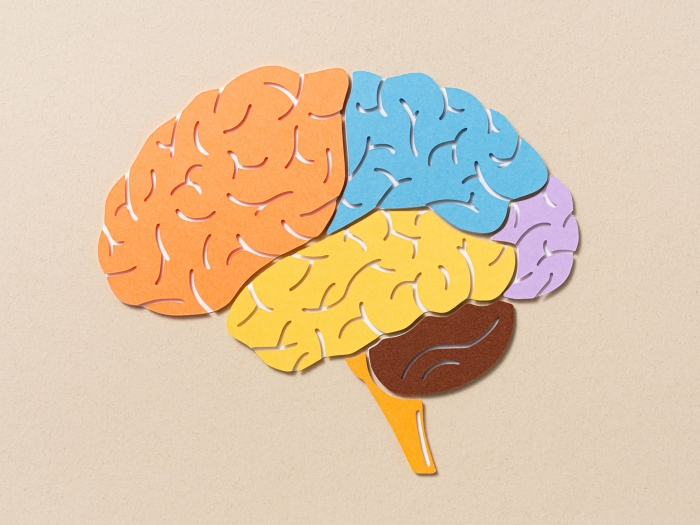A U-M athletic event honors those touched by ALS as well as the ongoing efforts to “ice” the deadly disease.
1:00 PM
Author |

Earlier this month, all eyes were on center ice in Yost Arena, the home of Michigan Wolverines hockey.
The reason: A special guest, former University of Michigan hockey player Scott Matzka — with his daughter Reese, pictured above, and his wife and son Owen watching — dropped the ceremonial puck to begin the Amyotrophic Lateral Sclerosis (ALS) Awareness Game.
SEE ALSO: Alzheimer's: Not Just a Disease for Older Adults
Matzka, now 38, played for U-M from 1997 to 2001, assisting on the goal that clinched the 1998 NCAA championship. After graduating from U-M in 2001 and playing professional hockey in the U.S. and Europe, he retired in 2012 to pursue a business career.
Just three years later, Matzka was diagnosed with ALS.
A progressive disease, ALS degrades and eventually kills the motor neurons that control movement, speech, swallowing and breathing. About 6,000 people in the United States are diagnosed each year — 15 new cases a day — according to the ALS Association.
There is no cure for ALS, also known as Lou Gehrig's disease. In the 77 years since the baseball great the disease is named after retired, only one FDA-approved drug (Rilutek) has been shown to be modestly effective in slowing its progression. On average, patients survive three to five years, the ALS Association says. More than half live three years or longer after diagnosis; 10 percent survive 10 years or beyond.
In a post on his personal website, Matzka explained that the first signs of trouble came in 2014 when he started to experience stiff fingers and cramping.
Muscle twitches and tremors followed — as did a battery of tests that led to confirmation of the diagnosis.
"My dexterity in my hands is pretty much zero at this time," the Kalamazoo resident said in an October interview with MGoBlue.com. "I can't open a Ziploc or button my shirt. Now, walking to the mailbox is a challenge."
Matzka acknowledges the disease's challenges, but wants to stay positive for his family — sentiments he recently shared online in an emotional essay.
"Life does not end with a diagnosis of ALS," he wrote. "In a way, it's like a new life has begun for me. And I don't want to waste it."

Team spirit
The Matzkas are one of three families connected to U-M hockey whose battles with ALS were honored at the October 8 faceoff against Union College — which U-M won 4-0.
Another ALS patient receiving treatment at U-M, Joe Feudi, and his wife, Jill (the business office manager for Yost Arena), attended the game with family members. Also present was the family of U-M hockey alumna Jim Ballantine (1988-1991), who died from ALS in 2002.
Many spectators, including the ALS Association Michigan Chapter director Paula Morning and staffers of the U-M ALS clinic where Matzka receives care, wore special T-shirts to mark the occasion.
The motto emblazoned on the back of each one: "Ice ALS."
"The 2014 'Ice Bucket Challenge' [which raised $115 million for the ALS Association] drew a lot of national attention to ALS," explains Eva Feldman, M.D., Ph.D., U-M ALS Program Research Director. "But we still have a long way to go to raise awareness and funding for ALS research. So we've taken to the ice again — in a different way — to keep ALS in the public eye."
"We're so grateful to these U-M hockey families touched by ALS for everything they're doing," Feldman says. "They are truly remarkable. They've received this diagnosis so bravely, and they're out here advocating and inspiring all of us to keep up the fight to 'ice ALS.' "

ALS research, treatment and advocacy
At U-M, that fight includes groundbreaking research.
Feldman is the principal investigator and director of the first-ever FDA-approved clinical trial of stem cells injected directly into the spinal cords of ALS patients. U-M investigators are also working to identify potential environmental factors contributing to ALS — and whether they may place Michigan residents at increased risk.
SEE ALSO: 5 Strategies to Help Caregivers Practice Self-Care
Experts also recognize the need for advocacy for those already diagnosed with ALS — which, at any given time, is estimated to be 30,000 Americans.
"We want to draw attention to the need for improving legislation and insurance coverage," says Feldman's colleague, Stephen Goutman, M.D., clinical director of the U-M Comprehensive ALS Clinic. "Improving the quality of life of ALS patients requires systems that can quickly adapt to progressive disabilities with the right equipment and support."
A BiPAP (bilevel positive airway pressure) machine, for example, aids in breathing during sleep and has been shown to extend survival. But ALS patients routinely struggle to get insurance providers to approve the device in a timely way, Goutman says.
Feldman and Goutman hope events such as the ALS Awareness Game will heighten public focus not only to the plight of patients but also to the struggles of their families and caregivers.
"Supporting caregivers is central to our program's mission," Goutman says. "This diagnosis eventually becomes a 24/7 caregiving job. The financial strain on families is equally burdensome, since ALS potentially removes both the patient and his or her spouse from the workforce."
For Matzka, ALS's financial burden has been among the biggest unexpected hurdles.
"We weren't prepared for the costs of coping with ALS," he says. "We're fortunate to have excellent health insurance — but even the best policy doesn't cover home health care, and you eventually need round-the-clock care, which is tremendously expensive."
Matzka is raising funds on his website, MyTurn, to help defray these costs, which he estimates may exceed $250,000 per year.
The hockey game, meanwhile, offered a chance to share fellowship and a love for the sport while keeping the cause front and center.
Throughout the evening, videotaped messages from players, family members and legendary U-M coach Red Berenson appeared on the Yost scoreboard while chants of "Ice ALS!" — led by Feldman and Goutman — rang out in the stands, urging the crowd to to follow Matzka's lead, and join the fight against ALS.

Explore a variety of health care news & stories by visiting the Health Lab home page for more articles.

Department of Communication at Michigan Medicine
Want top health & research news weekly? Sign up for Health Lab’s newsletters today!





